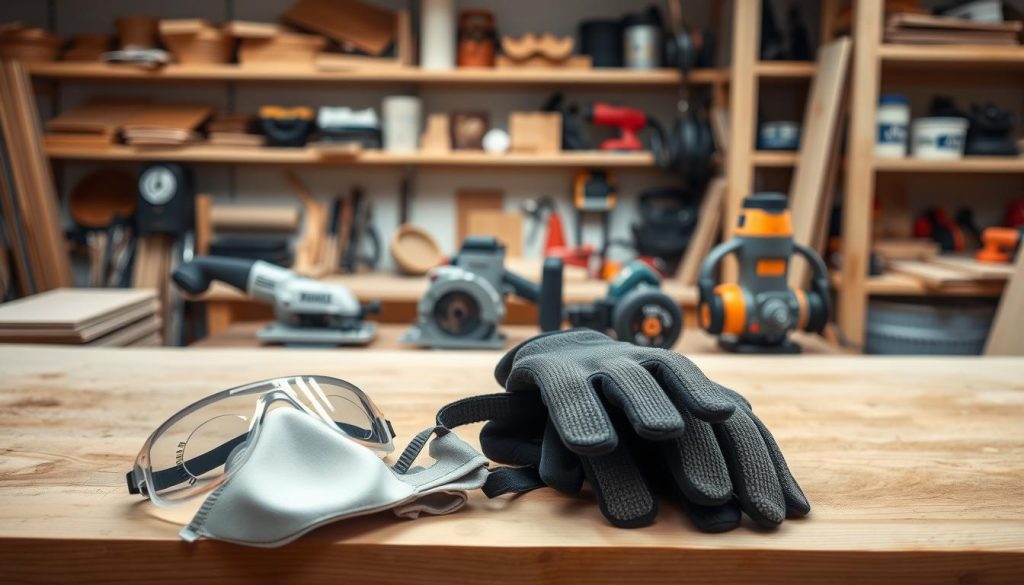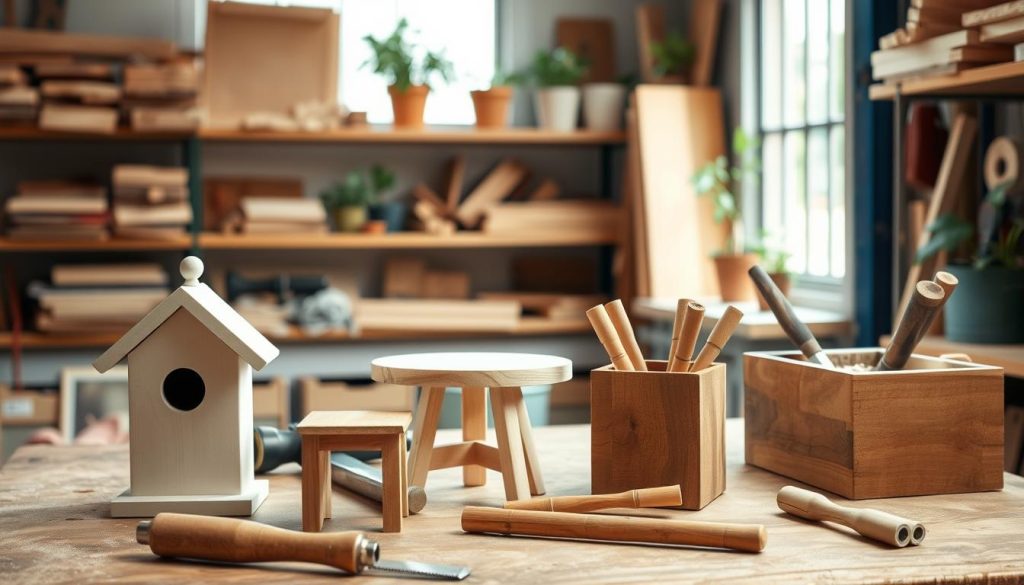Woodworking is a craft that turns raw wood into beautiful, useful items. For beginners, choosing the right tools is key to success. It can turn frustration into joy.
Woodworking lets you make everything from simple shelves to detailed furniture. To start, you need to know which tools are essential. They help you work with confidence and precision.
This guide is for both newbies and those with some skills. It covers the basic tools needed to unlock your woodworking potential. With the right tools and a love for creating, you’ll be amazed at what you can make.
Key Takeaways
- Woodworking requires specific tools for success
- Beginners can start with basic, affordable tools
- Proper tool selection enhances project quality
- Safety is crucial in woodworking
- Practice and patience are essential for skill development
Understanding the Basics of Woodworking Tools
Woodworking is an art that turns raw materials into beautiful, useful items. At its core are the tools that make woodworkers’ dreams come true. A good list of woodworking tools is key for anyone starting this hobby or career.
Woodworking tools are more than simple tools. They are a craftsman’s creativity and skill in action. These tools help with precision, efficiency, and turning wood into detailed designs and useful items.
Defining Woodworking Tools
A good woodworking tools collection has two main types:
- Hand Tools: These are traditional tools that you operate by hand.
- Power Tools: These are electrical or battery-powered tools that make work faster.
Selecting the Right Tools
Choosing the right woodworking tools is crucial for your projects. Quality tools improve your work’s precision, safety, and enjoyment. Beginners should start with a basic set of tools that meet their needs without breaking the bank.
- Begin with essential hand tools.
- Get multipurpose power tools.
- Choose quality over quantity.
Your tool choice should match your skill level, project complexity, and woodworking goals. As you get better, your tool list will grow. This will let you take on more complex and detailed projects.
Essential Hand Tools for Beginners
Woodworking hand tools are key to any successful project. For beginners, knowing the right tools is crucial. These tools will help you start your woodworking journey with confidence.
Saws: Cutting with Precision
Every woodworker needs a reliable set of saws. Different types are used for different tasks in your workshop:
- Hand Saw: Great for straight cuts and general wood cutting
- Coping Saw: Best for intricate curved cuts and detailed work
- Backsaw: Offers precise, straight cuts for joinery
Chisels: Shaping Your Craft
Chisels are versatile tools for shaping, carving, and smoothing wood. When choosing a chisel set, look for these:
- High-carbon steel material quality
- A range of sizes (1/4″, 1/2″, 3/4″, 1″)
- A comfortable handle grip
Measuring Tools: Accuracy Matters
Precision is vital in woodworking. Essential measuring tools ensure your projects are perfectly aligned. Invest in quality tools like tape measures, combination squares, and marking gauges to improve your skills.
Power Tools Every Beginner Should Consider
Woodworking power tools can make your craft fun and easy. These tools help beginners work faster and more accurately. Choosing the right tools is key to a great woodworking journey.
- Drill/Driver
- Jigsaw
- Random Orbital Sander
Drill/Driver: Your Workshop Workhorse
A drill/driver is the most useful tool in your workshop. It makes precise holes and drives screws easily. Look for one with adjustable torque and speed for different wood types.
Jigsaw: Mastering Complex Cuts
A jigsaw is key for flexible cuts. It’s great for curved cuts and shapes that regular saws can’t do. Beginners will find it easy to use and versatile.
Random Orbital Sander: Achieving Smooth Surfaces
A good random orbital sander is essential for smooth finishes. It smooths wood surfaces evenly without swirl marks. Choose one with variable speed and dust collection for the best finish.
Quality is more important than quantity when building your tool collection. Start with these basics and add more as you get better.
Safety First: Woodworking Safety Gear
Woodworking is a fun craft, but safety comes first. Every beginner’s guide stresses the importance of safety. By following safety tips, you can avoid accidents and enjoy woodworking.

Essential Personal Protective Equipment
When you start woodworking, getting the right safety gear is key. Experts say you need:
- Safety glasses to protect eyes from flying debris
- Hearing protection to prevent long-term ear damage
- Dust masks or respirators for lung protection
- Work gloves for hand safety
- Sturdy closed-toe shoes
Basic Safety Practices to Follow
Woodworking tools need careful handling and safety rules. Always keep your workspace clean and tools sharp. Never work when tired or distracted.
- Keep workspace clean and organized
- Inspect tools before each use
- Work in well-lit areas
- Avoid loose clothing
- Never use tools under the influence of alcohol or medication
Remember, your safety is more important than any project. Learning and following safety rules will make woodworking fun and safe.
Choosing the Right Wood for Your Projects
Choosing the right wood is key for woodworking beginners. The wood you pick can greatly affect your project’s look and how long it lasts. It’s important for beginners to know about wood types to make their projects successful.
For beginners, some wood types are better than others. Here are a few:
- Pine: An excellent starter wood that’s affordable and easy to work with
- Cedar: Lightweight and naturally resistant to decay
- Poplar: Smooth and great for painting projects
- Oak: Durable and perfect for more advanced beginner projects
Types of Wood for Beginners
Pine is the best wood for beginners. It’s soft, making it easy to cut and shape. This makes it perfect for those just starting out, as it’s less expensive.
Where to Buy Quality Wood
Finding good wood is important for woodworking success. Here are some places to look:
- Local lumber yards
- Home improvement stores
- Specialty woodworking shops
- Online wood suppliers
Tip for beginners: Always check the wood before buying. Look for straightness, no knots, and quality. Start with small, cheaper pieces as you get better.
Setting Up Your Woodworking Space
Creating a good woodworking area is key for beginners. You don’t need a lot of space, but it should be well-organized. Whether in a garage, basement, or a small corner, planning well can make any space great for woodworking.
Building the perfect woodworking area takes some thought. The right setup can make your projects more fun and productive.
Choosing the Right Workbench
A good workbench is the base for your tools. Look for these important things:
- Stability and weight capacity
- Height that’s comfortable for you
- Surface material (hardwood is best)
- Enough space for your work
Tool Organization Strategies
Keeping tools organized makes your space better and protects your tools. Here are some smart ways to store them:
- Wall-mounted pegboards for hanging tools
- Magnetic tool strips for metal tools
- Rolling tool chests for easy storage
- Dedicated shelving units
A tidy workspace is not just about looks. It’s about safety and making your woodworking easier.
Cost-Effective Tips for Starting Your Toolkit
Building a woodworking toolkit doesn’t have to be expensive. You can get the best tools without spending too much. It’s all about knowing which tools are must-haves and which can wait.
When you start your toolkit, choose quality over quantity. Beginners should focus on versatile, basic tools that offer the most value.
Buying Used Tools: Smart Savings Strategies
Buying second-hand tools can save you a lot of money. Here are some tips:
- Check local pawn shops for quality used tools
- Browse online marketplaces like Craigslist and Facebook Marketplace
- Attend garage sales and estate sales
- Inspect used tools carefully for wear and functionality
Essential vs. Optional Tools
Not all woodworking tools are the same. Some are key for beginners, while others can be added later.
- Essential tools:
- Hammer
- Tape measure
- Combination square
- Chisels
- Hand saw
- Optional tools to acquire later:
- Router
- Specialized sanders
- Advanced power tools
Building your woodworking toolkit is a journey. Start small, invest in quality for tools you use often. Then, add more as you get better and take on bigger projects.
Project Ideas for Beginners
Starting your woodworking journey can be both exciting and a bit scary. The best way to build confidence is to pick projects that fit your skill level. Beginners should aim for simple projects that help learn the basics.

- Cutting Board: Perfect for practicing straight cuts and basic assembly
- Picture Frames: Helps develop precision and measurement skills
- Simple Shelves: Introduces basic joinery and mounting techniques
- Wooden Coasters: Small project to practice sanding and finishing
- Basic Toolbox: Combines multiple woodworking skills in one project
Finding Woodworking Plans
There are many places where beginners can find project plans and advice. Some top places include:
- Popular Woodworking Magazine website
- YouTube tutorial channels
- Woodworking blogs and online communities
- Local woodworking shops offering workshops
Remember, every expert woodworker started where you are now. View mistakes as chances to learn and enjoy making something with your hands.
Learning and Skill Development
Mastering woodworking tools for beginners takes dedication and continuous learning. Every skilled woodworker began where you are now. They were eager to learn and develop their skills.
Online Resources for Skill Enhancement
The digital world is full of great opportunities for woodworking fans. Many platforms offer in-depth learning experiences:
- YouTube tutorial channels focused on woodworking techniques
- Comprehensive online courses from top woodworking schools
- Detailed woodworking blogs with step-by-step guides
- Interactive webinars with expert craftsmen
Joining Woodworking Communities
Connecting with other woodworking enthusiasts can really help you learn faster. These communities offer great support, practical advice, and motivation for beginners.
- Local woodworking clubs
- Online forums and discussion groups
- Social media woodworking networks
- Regional workshops and skill-sharing events
Remember, woodworking is a journey of continuous improvement. Start with simple projects, practice often, and don’t hesitate to ask questions. Your skills will grow with each piece you make.
Maintaining Your Tools for Longevity
Keeping your woodworking tools in good shape is key for any serious woodworker. Good care extends their life and keeps them working well. It’s important to clean and store them right to avoid rust, wear, and damage.
Cleaning your tools should be a regular habit after each project. Use special cloths to wipe away sawdust and wood bits from hand and power tools. Compressed air is great for getting into tight spots in power tools. A light oil coat on metal parts stops rust and keeps things running smoothly.
Blade care is especially important. Use professional sharpening stones or services to keep blades sharp. Dull blades cut poorly and can be dangerous. For power tool blades, like those on circular saws or jigsaws, it’s often better to replace them when they’re worn out.
How you store your tools is also crucial. Get a good toolbox or wall-mounted system to keep them dry and dust-free. A climate-controlled area helps prevent rust and warping. Remember, storing tools right is as important as cleaning them for long-lasting use.